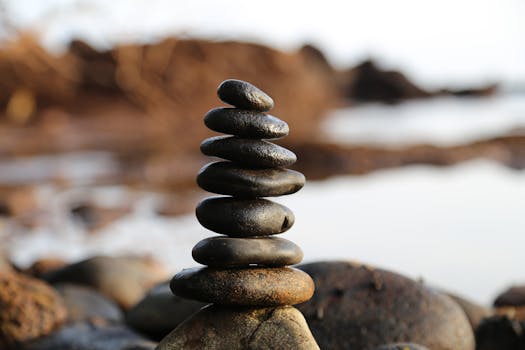
“
Mindfulness Practices for Stress Relief: Finding Inner Peace
Mindfulness practices have become increasingly popular in recent years, and for good reason. With the constant demands of modern life, it’s easy to get caught up in stress and anxiety. However, by incorporating mindfulness into our daily routine, we can reduce stress, improve our mental health, and increase our overall sense of well-being.
What is Mindfulness?

Mindfulness is the practice of being present in the moment, paying attention to our thoughts, feelings, and sensations without judgment. It’s about cultivating awareness and acceptance of our experiences, rather than trying to change or react to them. Mindfulness can be practiced through various techniques, including meditation, yoga, and deep breathing exercises.
Mindfulness Practices for Stress Relief

There are many mindfulness practices that can help reduce stress and anxiety. Some of the most effective include:
- Meditation: Meditation involves sitting comfortably, focusing on your breath, and letting go of distracting thoughts. Regular meditation practice can help reduce stress, improve mood, and increase feelings of relaxation and calm.
- Yoga: Yoga combines physical movement with deep breathing and meditation techniques. It can help reduce stress, improve flexibility, and increase overall sense of well-being.
- Deep Breathing Exercises: Deep breathing exercises involve focusing on slow, deliberate breaths, often through the nose and out the mouth. This can help calm the nervous system, reduce stress, and promote relaxation.
- Body Scan: A body scan involves lying down or sitting comfortably, and bringing awareness to different parts of the body, starting from the toes and moving up to the head. This can help release physical tension, reduce stress, and promote relaxation.
Benefits of Mindfulness Practices

The benefits of mindfulness practices are numerous and well-documented. Some of the most significant advantages include:
- Reduced Stress and Anxiety: Mindfulness practices have been shown to reduce stress and anxiety by promoting relaxation, improving mood, and enhancing emotional regulation.
- Improved Mental Health: Mindfulness practices have been linked to improved mental health outcomes, including reduced symptoms of depression and anxiety disorders.
- Increased Self-Awareness: Mindfulness practices can increase self-awareness, allowing us to better understand our thoughts, feelings, and behaviors, and make positive changes in our lives.
- Improved Relationships: Mindfulness practices can improve relationships by increasing empathy, compassion, and understanding, and promoting more effective communication.
Getting Started with Mindfulness Practices

Getting started with mindfulness practices is easier than you think. Here are some tips to help you get started:
- Start Small: Begin with short, manageable practice sessions, such as 5-10 minutes per day, and gradually increase as you become more comfortable with the practice.
- Find a Quiet Space: Identify a quiet, comfortable space where you can practice mindfulness without distractions.
- Use Guided Recordings: Utilize guided recordings, such as meditation apps or YouTube videos, to help you get started and stay on track.
- Make it a Habit: Incorporate mindfulness practices into your daily routine, such as right after waking up or before bed, to make it a consistent part of your life. For more tips on creating a peaceful atmosphere, check out our post on creating a cozy atmosphere with lighting solutions.
See more:
https://www.mindful.org/
https://www.headspace.com/
https://www.calm.com/






